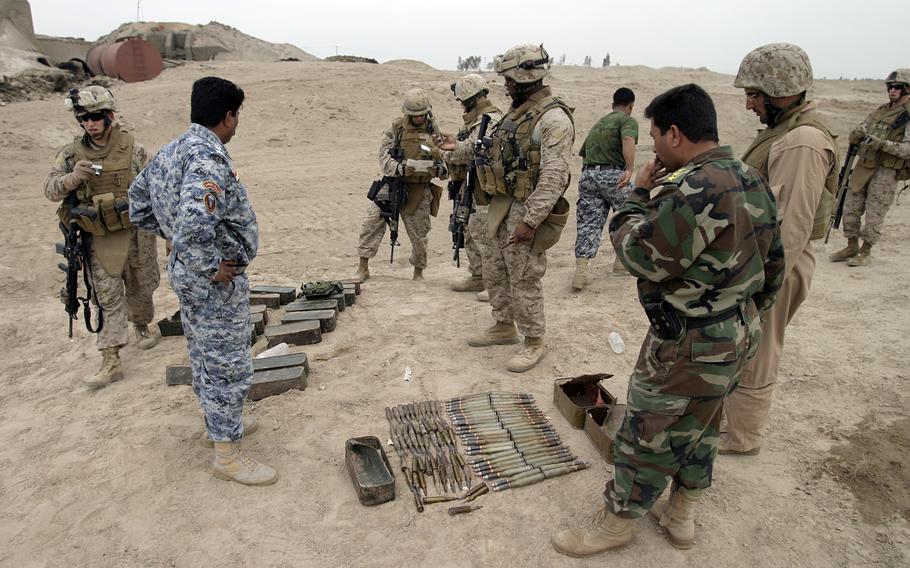
Members of 2nd Battalion, 3rd Marine Regiment look over part of a weapons cache discovered by the Marines and members of the Iraqi Civilian Watch outside of Subyhat, Iraq, March 13, 2008. (Brett Shemanski/U.S. Marine Corps)
FORT SHAFTER, Hawaii – The Marine Corps will deactivate the Hawaii-based Island Warriors on Friday, casing the colors of a battalion that fought in World War II, the Vietnam War and the Global War on Terrorism.
The storied 2nd Battalion, 3rd Marine Regiment is slated to deactivate during a ceremony at Marine Corps Base Hawaii.
“The lineage of 2/3 includes many years of watchful peace, and some of the toughest and bloodiest battles in our history,” Lt. Gen. James Bierman, commander of III Marine Expeditionary Force, wrote in a memo to the battalion on Jan. 14.
“This deactivation brings up understandable feelings of fierce pride and loss in all who have served in the battalion,” Bierman wrote.
The deactivation is part of a Corps-wide restructuring under Force Design 2030, which is revamping the service into the lean, island-hopping force it was in the Pacific theater during World War II.
The battalion was originally activated in May 1942, just five months after the Japanese surprise attack on Hawaii that led to America’s declaration of war on Japan and Germany.
Its troops were on the front lines of some of the most ferocious battles of the Pacific, including the Solomon Islands, Guam and Iwo Jima.
Pfc. Leonard Mason was awarded a posthumous Medal of Honor for his actions during the Battle of Guam on July 22, 1944.
An automatic rifleman, the 24-year-old Marine was credited with saving the lives of his platoon mates by single-handedly clearing out two enemy machine-gun nests while mortally wounded.
“With valiant disregard for his own peril, he persevered, clearing out the hostile position, killing 5 Japanese, wounding another and then rejoining his platoon to report the results of his action before consenting to be evacuated,” the award citation reads.
The battalion was deactivated in 1945 for six years, followed by more than a decade of noncombat deployments.
The Island Warriors fought in Vietnam from 1965 to 1969, operating out of Danang, Quang Tri and Khe Sanh, among other bases. Three of the battalion’s Marines were awarded Medals of Honor in separate incidents during that war – all posthumously.
The battalion was deployed to Saudi Arabia for Operations Desert Shield and Desert Storm in 1991, following Iraq’s invasion of Kuwait.
It deployed to Afghanistan in 2005-2006, 2009 and 2010-2011 and to Iraq in 2006-2007 and 2008.
Bierman said in the memo that he would forever feel a “strong bond” with the men and women of the battalion, despite never serving within its ranks, because of its role in Iraq.
“In 2007, I deployed with the 1/3 into the Haditha Triad shortly after the Marines and Sailors of the 2/3 broke the back of the enemy insurgency and lifted up the Iraqi people in months of sustained fighting,” he wrote.
Bierman described the Island Warriors as “one of the finest and most storied battalions currently in the Marine Corps.”
“There is every likelihood that we have not seen the last of 2/3; it may be the page is only being turned on the latest chapter,” he wrote.